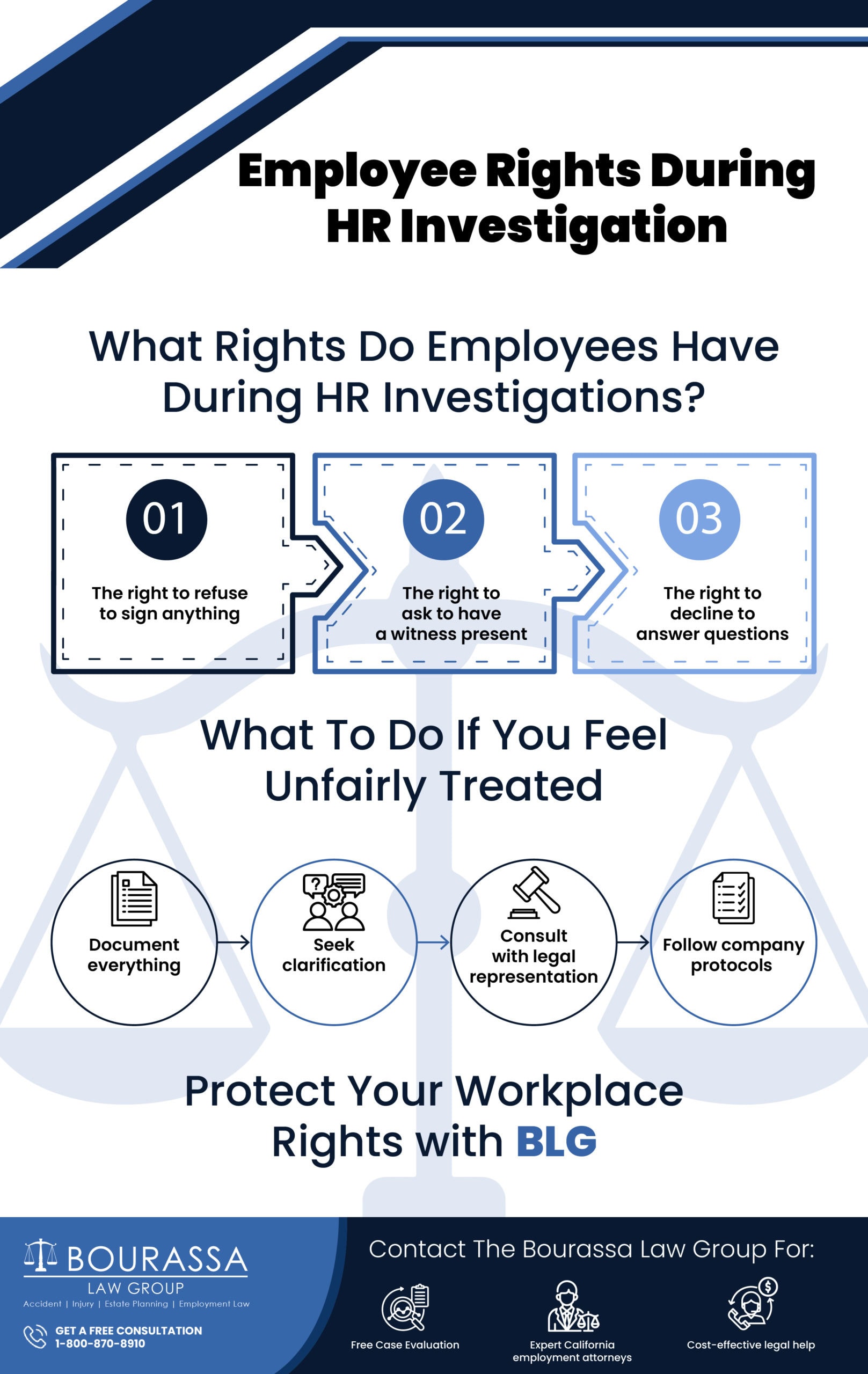
Human resources investigations are common in workplaces worldwide. Whether prompted by allegations of misconduct, discrimination, harassment, or other workplace issues, these investigations are essential for maintaining a safe and fair work environment. However, navigating the process can be daunting and stressful for employees who find themselves the subject of such investigations.This comprehensive guide will delve into the various facets of employee rights during HR investigations, what to expect, and how to navigate this often challenging terrain.
Understanding HR Investigations
HR investigations are a standard procedure companies employ to address various workplace issues, such as investigating complaints, harassment, discrimination, workplace violence, and company policy violations. These investigations aim to maintain a fair and respectful work environment while upholding the rights and well-being of all employees involved.
What Rights Do Employees Have During HR Investigations?
When you find yourself the subject of an internal workplace investigation, it’s vital to be aware of your rights. Here’s a breakdown of the key rights employees hold during HR investigations:
The Right to Refuse to Sign Anything: Employees have the right to refuse to sign any documents presented during an HR investigation. This includes statements, employee reports, or any other paperwork. Reviewing the documents thoroughly and seeking legal advice before putting your signature on anything is essential.
The Right to Ask to Have a Witness Present During the Investigation: A critical right during HR investigations is the ability to request the presence of a witness. This can be a fellow employee, a union representative, or a lawyer. Having a witness can provide additional support and ensure your perspective is accurately represented.
The Right to Decline to Answer Questions: While cooperation is generally encouraged during investigations, employees have the right to decline to answer specific questions. If a question seems inappropriate or irrelevant, you can express your concerns and seek guidance on how to proceed.
Expectations of Employees During HR Investigations
Understanding your rights is only part of the equation; knowing what is expected of you during an HR investigation is equally crucial. Here are some general expectations:
Provide Honest Answers: Cooperation is key. Be honest and forthcoming during interviews and discussions. Misleading information can complicate the investigation and may have consequences.
Be Responsive: Respond promptly to requests for information or meetings. Delays in providing necessary details can prolong the investigation process.
Maintain Professionalism: While emotions may run high during investigations, strive to maintain professionalism. Avoid confrontations and focus on constructive communication.
What To Do If You Feel Unfairly Treated During an HR Investigation?
If, at any point during the HR investigation, you feel unfairly treated or believe your rights are being violated, it’s crucial to take appropriate action. Here are steps you can consider:
Document Everything: Keep detailed records of all communication and interactions related to the investigation. This includes emails, conversations, and any documents exchanged.
Seek Clarification: If you are uncertain about any aspect of the investigation or feel that your rights are being compromised, seek clarification from the Human Resources department or the investigator.
Consult With Legal Representation: If the situation escalates, consulting with a lawyer specializing in employment law can provide valuable insights and guidance on protecting your rights.
Follow Company Protocols: Adhere to your company’s policies and procedures throughout the investigation. This demonstrates your commitment to a fair process and ensures that you are not in a workplace violation of any internal rules.
Employee Rights to Reasonable Accommodations
In certain situations, employees may require reasonable accommodations during HR investigations. These accommodations can include adjustments to work schedules, changes in work locations, or other modifications that enable employees to participate fully in the investigative process.
Rights to Access Investigation Records
Employees have the right to access records related to the investigation. This includes any written investigation report, witness statements, or other documentation. This transparency ensures that the process remains fair and accountable.
Rights to Privacy and Confidentiality
While investigations are conducted, employees have the right to privacy and confidentiality. Information shared during the investigation should only be disclosed on a need-to-know basis. This safeguards the privacy of all parties involved.
Rights to Speak With an Attorney
Employees have the right to seek legal representation during an HR investigation. Consulting with a lawyer can help you understand your rights, guide you through the process, and ensure that your interests are protected.
Navigating Workplace Investigations: Practical Tips
Understanding your rights is crucial, but navigating the investigation process effectively is equally important. Here are some practical tips:
Stay Informed: Be aware of your company’s policies, employment contract, procedures, and the contents of your employee handbook. Knowledge is a powerful tool in protecting your rights.
Cooperate Professionally: While it may be challenging, maintaining professional and disciplinary action during the investigation can work in your favor. It demonstrates your commitment to resolving the issue amicably.
Collect Evidence: If you believe you are being treated unfairly, gather evidence to support your case. This may include emails, witness statements, or any other relevant documentation.
Communication is Key: Open and honest communication with HR and the investigator is crucial. If you have concerns, express them respectfully and seek clarification.
How an Attorney Can Help
Facing an internal workplace investigation is a challenging experience, and having legal representation can significantly impact the outcome. Here’s how an attorney can assist you in safeguarding your rights during HR investigations:
Legal Guidance: Attorneys offer expertise in employment law, providing essential guidance on your rights and interpreting company policies.
Fair Treatment Advocacy: Acting as your advocate, an attorney ensures fairness in the investigative process, identifying and addressing procedural errors or biases.
Documentation Review: Attorneys scrutinize extensive investigation documentation, helping you understand its implications and identifying potential legal issues.
Strategic Advice: Attorneys help devise a strategic approach, advising on effective case presentations and recommending communication strategies with HR and investigators.
Negotiation Skills: In negotiations or discussions on corrective actions, attorneys advocate for your interests to secure resolutions aligning with your rights and objectives.
Retaliation Prevention: Lawyers help you prevent retaliation for participating in an investigation and take legal action if needed.

Protect Your Workplace Rights with BLG
Understanding your rights as an employee in California during HR investigations is essential for maintaining a fair and respectful workplace. You can confidently navigate these challenging situations by being informed, cooperating with the investigative process, and seeking appropriate legal counsel when needed. Remember, your rights matter, and advocating for them ensures a workplace environment that respects and protects every individual.
At BLG, we understand the importance of safeguarding your rights in the workplace. If you find yourself facing an HR investigation or have concerns about the process, our experienced employment law attorneys are here to help.
Contact BLG today to schedule a free consultation.
FAQs
What not to say in an HR investigation?
In an HR investigation, avoid providing false information or making baseless accusations. Be honest and transparent, and avoid discussing details with colleagues to maintain confidentiality.
What to do if HR is investigating you?
If you are being investigated by HR, stay calm, cooperate fully, and provide truthful information. Avoid hiding details and seek clarification if needed. Consider seeking guidance from a professional, such as an employment lawyer.
How long should a workplace investigation take?
The duration varies depending on the complexity. Simple cases may be resolved within weeks, while intricate ones might take months. To ensure a fair and prompt resolution, ensure efficiency without compromising thoroughness.
What not to say in a meeting with HR?
In HR meetings, avoid offensive language, discriminatory remarks, and disrespectful behavior. Also, avoid providing misleading information and focus on relevant matters for a constructive interaction.





